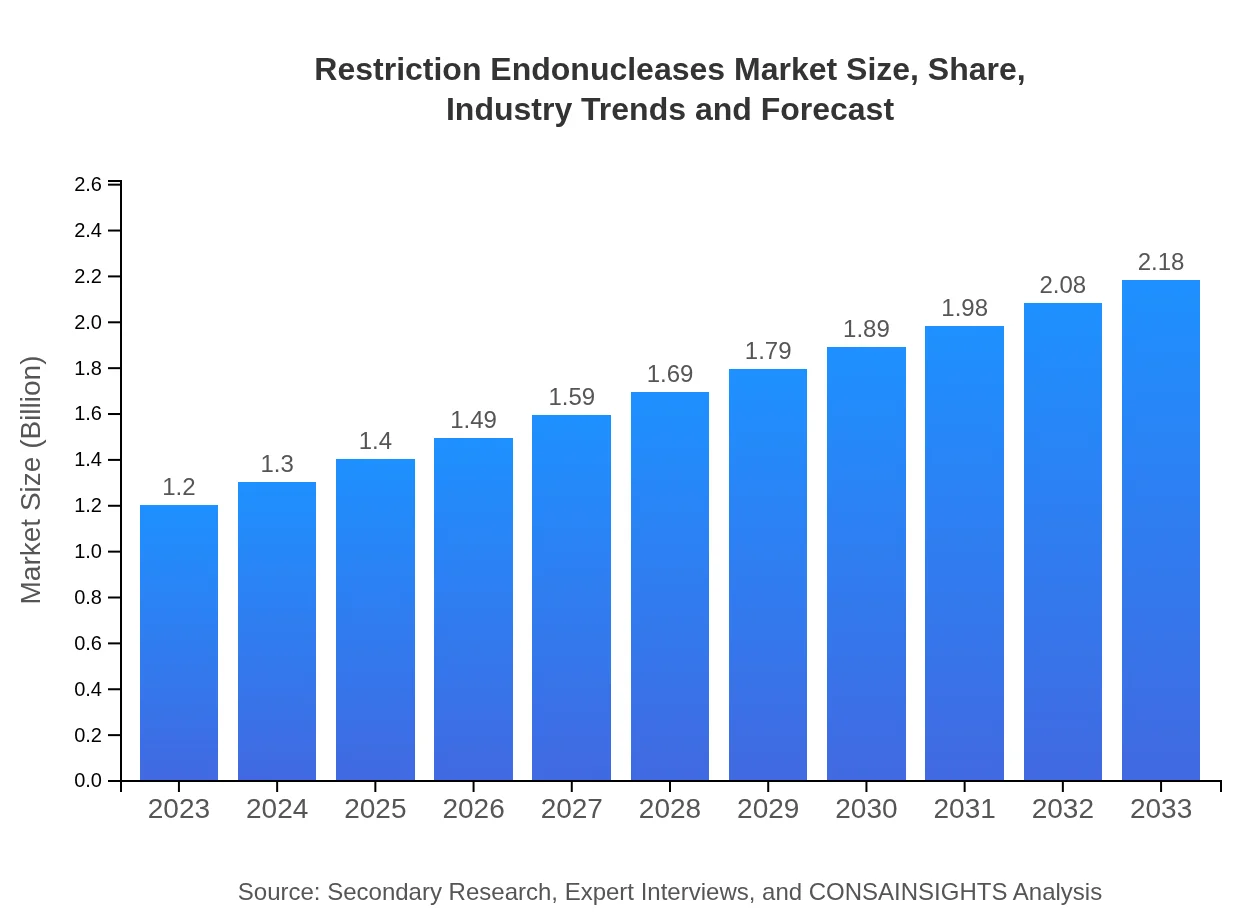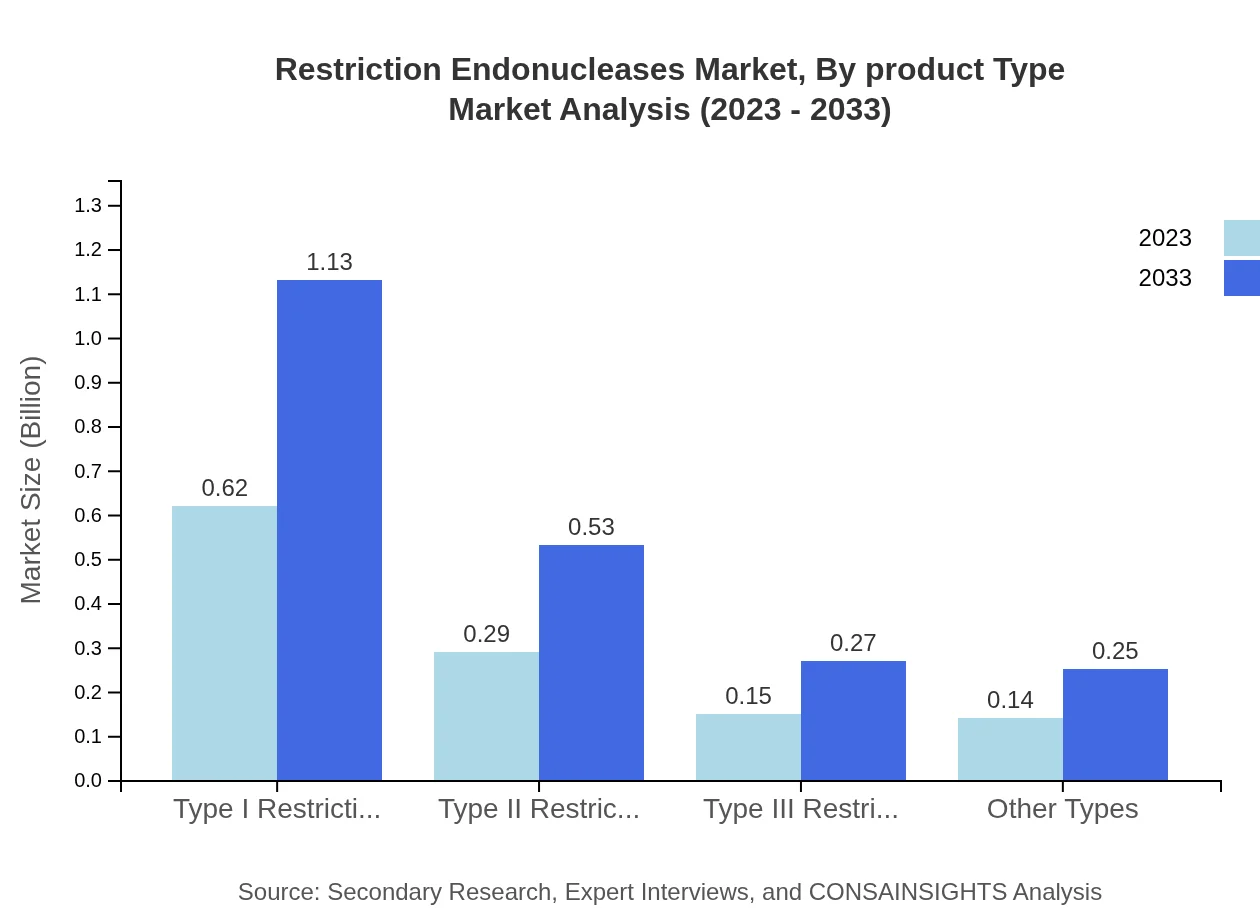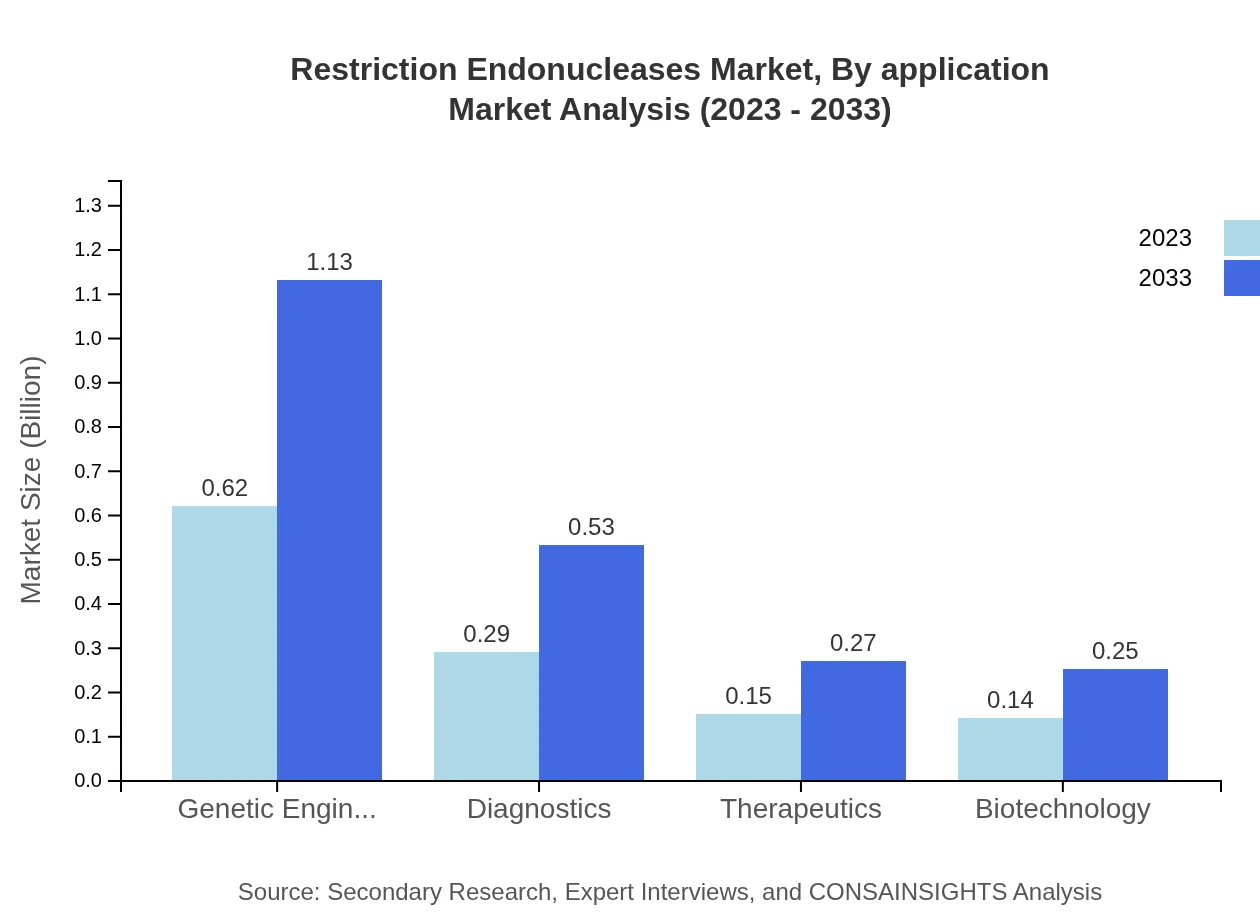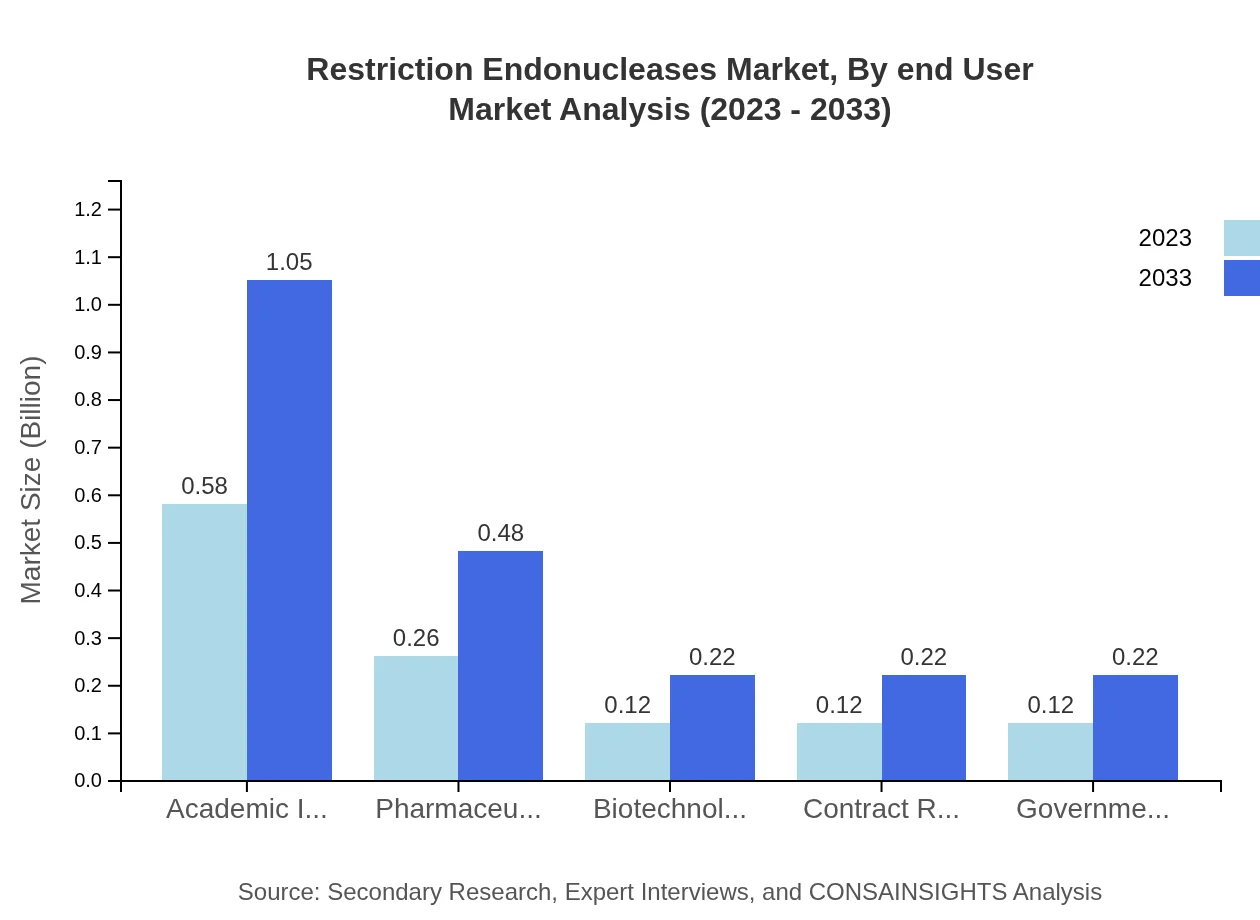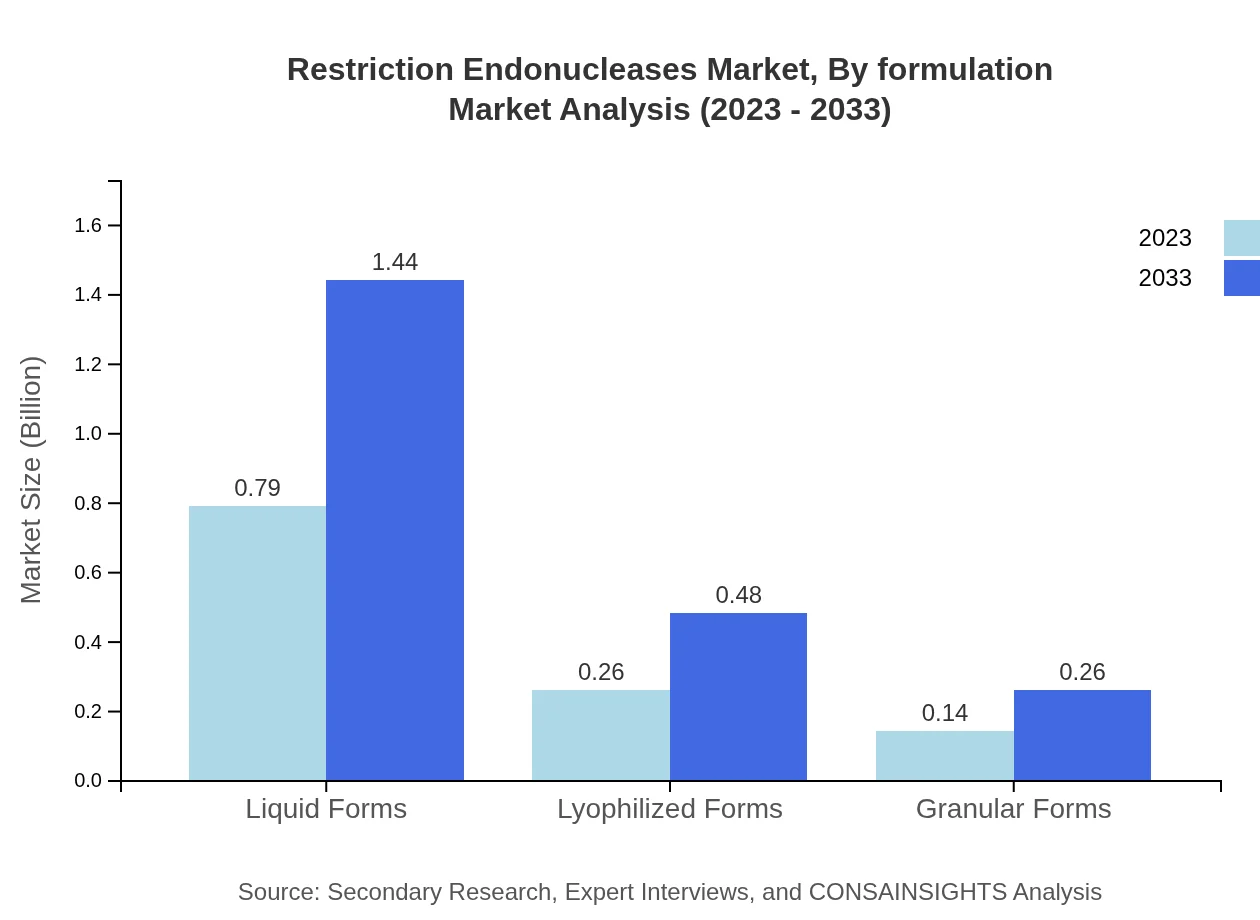Restriction Endonucleases Market Report
Published Date: 31 January 2026 | Report Code: restriction-endonucleases
Restriction Endonucleases Market Size, Share, Industry Trends and Forecast to 2033
This report provides an in-depth analysis of the Restriction Endonucleases market, exploring current market trends, size projections, and key insights from 2023 to 2033.
| Metric | Value |
|---|---|
| Study Period | 2023 - 2033 |
| 2023 Market Size | $1.20 Billion |
| CAGR (2023-2033) | 6% |
| 2033 Market Size | $2.18 Billion |
| Top Companies | Thermo Fisher Scientific, New England Biolabs, Takara Bio, Promega Corporation, Sigma-Aldrich (Merck Group) |
| Last Modified Date | 31 January 2026 |
Restriction Endonucleases Market Overview
Customize Restriction Endonucleases Market Report market research report
- ✔ Get in-depth analysis of Restriction Endonucleases market size, growth, and forecasts.
- ✔ Understand Restriction Endonucleases's regional dynamics and industry-specific trends.
- ✔ Identify potential applications, end-user demand, and growth segments in Restriction Endonucleases
What is the Market Size & CAGR of Restriction Endonucleases market in 2023?
Restriction Endonucleases Industry Analysis
Restriction Endonucleases Market Segmentation and Scope
Tell us your focus area and get a customized research report.
Restriction Endonucleases Market Analysis Report by Region
Europe Restriction Endonucleases Market Report:
In Europe, the market is set to increase from USD 0.36 billion in 2023 to USD 0.65 billion by 2033, supported by strong research initiatives and prioritization of genetic research to tackle diseases.Asia Pacific Restriction Endonucleases Market Report:
In the Asia Pacific region, the market is projected to grow from USD 0.23 billion in 2023 to USD 0.42 billion by 2033, driven by increasing investments in biotechnology research and collaborations among academic and industrial entities.North America Restriction Endonucleases Market Report:
North America represents a dominant share of the market, with a projected growth from USD 0.38 billion in 2023 to USD 0.70 billion by 2033. The region benefits from a robust life sciences sector and extensive research infrastructure.South America Restriction Endonucleases Market Report:
The South American market for Restriction Endonucleases is expected to expand from USD 0.07 billion in 2023 to USD 0.12 billion by 2033, with growth fueled by rising demand for advanced research tools and government support for biotechnology projects.Middle East & Africa Restriction Endonucleases Market Report:
The Middle East and Africa market is forecasted to grow from USD 0.16 billion in 2023 to USD 0.29 billion by 2033, driven by improving access to research funding and growing academic research facilities.Tell us your focus area and get a customized research report.
Restriction Endonucleases Market Analysis By Product Type
The market comprises various product types, with Type I Restriction Endonucleases leading the segment at USD 0.62 billion in 2023 and projected to grow to USD 1.13 billion by 2033. Type II follows with a market size of USD 0.29 billion, expected to rise to USD 0.53 billion, while Type III and other types contribute significantly to the overall market.
Restriction Endonucleases Market Analysis By Application
Academics represent the largest application segment, with a market size of USD 0.58 billion in 2023, projected to reach USD 1.05 billion by 2033. Pharmaceutical companies and biotechnology firms also hold significant shares, showing robust growth in their respective segments as they increasingly utilize Restriction Endonucleases in drug development and genetic research.
Restriction Endonucleases Market Analysis By End User
End-user segments include academic institutions, government and non-profit organizations, and commercial entities, with distinct growth patterns. Academic institutions dominate the landscape, enjoying a favorable market share due to their continuous research-oriented activities. The increasing application of genetic engineering in healthcare also supports growth across various sectors.
Restriction Endonucleases Market Analysis By Formulation
The formulation segment is categorized into liquid and lyophilized forms, with liquid forms leading at USD 0.79 billion in 2023 and expected to grow to USD 1.44 billion by 2033. Lyophilized forms also show promise, increasing from USD 0.26 billion to USD 0.48 billion within the same timeframe.
Restriction Endonucleases Market Trends and Future Forecast
Tell us your focus area and get a customized research report.
Global Market Leaders and Top Companies in Restriction Endonucleases Industry
Thermo Fisher Scientific:
A leading provider of scientific instrumentation and reagents, Thermo Fisher offers a wide range of Restriction Endonucleases vital for genetic modifications and molecular biology applications.New England Biolabs:
Specializes in the development and production of enzymes for genomic research, New England Biolabs is recognized for its innovations in Restriction Endonucleases, providing vital products for researchers and laboratories.Takara Bio:
Takara Bio is known for its extensive biotechnology research tools, including a wide variety of Restriction Endonucleases, contributing significantly to advancements in molecular biology.Promega Corporation:
Promega supplies high-quality reagents and systems for the life sciences industry; its Restriction Endonucleases are pivotal for research laboratories focused on genetic engineering and biopharmaceuticals.Sigma-Aldrich (Merck Group):
A major name in the life sciences market, Sigma-Aldrich provides a wide array of enzymes including Restriction Endonucleases, supporting a broad spectrum of research applications and innovations.We're grateful to work with incredible clients.









FAQs
What is the market size of restriction Endonucleases?
The global restriction endonucleases market is currently valued at approximately $1.2 billion in 2023, with a projected growth rate of 6% CAGR, reaching significant milestones by 2033.
What are the key market players or companies in this restriction Endonucleases industry?
Key players in the restriction endonucleases market include prominent biotechnology firms, pharmaceutical corporations, and various academic institutions, each contributing to the growth and innovation in gene-editing technologies.
What are the primary factors driving the growth in the restriction Endonucleases industry?
The market growth for restriction endonucleases is driven by the increasing demand for genetic engineering, advancements in biotechnology, rising funding for research, and the growing adoption of synthetic biology applications.
Which region is the fastest Growing in the restriction Endonucleases?
The North American region is projected to be the fastest-growing market, expected to grow from $0.38 billion in 2023 to $0.70 billion by 2033, heavily driven by technological advancements and research initiatives.
Does ConsaInsights provide customized market report data for the restriction Endonucleases industry?
Yes, ConsaInsights offers customized market report data tailored to specific research needs and interests within the restriction endonucleases industry, ensuring relevant and actionable insights.
What deliverables can I expect from this restriction Endonucleases market research project?
Deliverables include detailed market analysis reports, segmentation insights, regional breakdowns, competitive landscape assessments, and future forecasts that equip stakeholders for informed decision-making.
What are the market trends of restriction Endonucleases?
Current trends include rising usage in genetic diagnostics, growth in academic research applications, and a shift towards liquid forms of endonucleases, reflecting significant advancements in methodologies and technologies.

